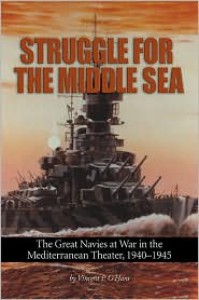Corrects misconceptions about the war in the Mediterranean

Though overshadowed by the larger battles in the Atlantic and the Pacific, the conflict in the Mediterranean, as Vincent O’Hara states in the beginning of this book, was “World War II’s longest air-land-sea campaign,” one that involved five of the world’s six largest navies. His book, an account of the clash between the surface forces, offers a balanced examination of the conflict that corrects many of the misconceptions which clutter our understanding of the conflict there. What emerges is a very different take on the war in the Mediterranean, one that provides far better insight into how the war developed and changed as a result.
Foremost among the myths that O’Hara pursues is that of Italian incompetence, which he dispels convincingly by noting their success in achieving their primary strategic objectives throughout most of the war, as well as the tenacious challenge they posed to the British. Though the Germans are traditionally seen as the Axis power which did the bulk of the heavy lifting in the region, O’Hara disputes this as well, noting that the Kriegsmarine’s combat performance there was in fact inferior to that of the much-disparaged Regia Marina. Nor are the British and French spared from O’Hara’s revisionary analysis, as he makes a strong case for the French fleet’s ongoing effort to preserve their nation’s sovereignty while arguing that the British only triumphed in the Mediterranean as a result of the infusion of American forces into the region in the fall of 1942.
O’Hara’s points are presented in a convincing and forthright manner, one that aids the book in challenging traditional attitudes about the war there. Yet it suffers from two significant flaws. The first is O’Hara’s focus on the surface actions, a curious decision which marginalizes vital components of the sea war. Even the famous air raid on the Italian naval base on Taranto, one of the turning points of naval history, is addressed in a mere two sentences that offer little consideration of the broader impact of the raid. O’Hara’s almost exclusive reliance upon secondary and published sources is the other major limitation of his work, as his trodding of ground well covered by others limits the real novelty of his argument. Such deficiencies limit the impact of what is otherwise a provocative reexamination of the war in the Mediterranean, one that every student of naval conflict in the Second World War can read for enjoyment as well as enlightenment.






